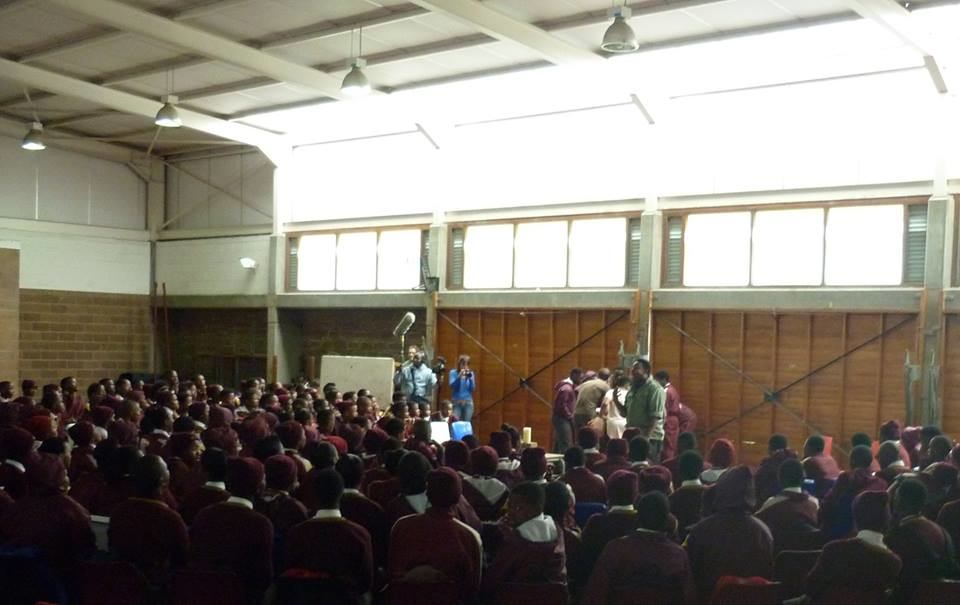
Well. Let it not be said we let the excitement flag at the end of the tour.
Through a friend of Phumzile’s, we performed this morning at Masibambane School for about 250 high school students. Before the show even started, Alice Oldenburg, our filmmaker, rushed in to inform us that she’d seen kids in the field beyond the auditorium being warded by a group of older boys armed with machetes.
Attempting to unsound the alarm, she pointed out that it was probably just a chest-thumping territory tiff between after-school gangs, more bark than bite. The older boys wouldn’t actually come near the school. That that was the last we heard of the machete crew backs up her view. I can tell you, though, that the news gave a sinister edge to all the sound pouring through the back wall in the course of the show.
The kids seated in the auditorium turned out to be a bit of a challenge as well: they were our most unruly group yet. And that’s before one of the girls collapsed in an epileptic fit.
It was the middle of the Tiresias scene. Phumi, cloaked in her black Hessian robe and blinded by a saffron scarf, was shouting violent prophesies at the King when a scream went up from the middle of the audience. The center seating seemed to collapse, and students and chairs shot out along the radii. Marcel, Leigh, and I jumped in to clear space and discovered one of the kids shaking on the floor, spots of blood on her hand and upper lip.
Not for the first time, we saw how lucky we were to have Peter Romano in the company. In addition to being an actor and multi-instrumentalist music director, Peter has years on as an EMT. “Peter’s a nurse. Out of the way, Peter’s a nurse,” Marcel shouted. Peter jumped in and got the student settled on her back, a nice wide circle around her, as she rode out the clonic phase.
After a few more convulsions, Peter led the team carrying the student across the parking lot and into one of the other school buildings, up a flight of stairs, down the hall, and into the nurse’s room. By the time we eased her down onto the bed, the student was evidently postictal. Peter checked in with the staff, and then we marched back into the auditorium to finish the play.
The rest of the show went on without event, but, due to the time delay, we were forced to rush on without our usual talkback.
We had another show to get to in the afternoon.
Our final show of the tour took place at Project Playground in Gugulethu. Project Playground is an NPO supporting children in Cape Town townships. In Gugulethu, we visited a brilliant school, where, in the two hours we were there, I saw the kids engaged in classes with dedicated teachers, gardening in the courtyard, and receiving good meals from the kitchen staff. Our host was Phila Sa’eeda Nkuzo, the Center Manager, who was generally followed around by groups of children like little ducklings. She led us into the church room with its blue carpet and dozens of chairs in bright colors. The late-day light slanted down through the windows and gave the whole cast a glow as Phumi ran around taking photos with Alice’s camera.
“If there’s anything you’ve wanted to do,” Gregory said to the actors, “anything you’ve been thinking of trying…now’s the time.”
And they did. Phumi and Kea injected an urgency into the first scene that drove them round about the stage and through the dialogue in half the time they had been taking. Peter dialed Hamon’s confrontation with the elders of Thebes (the audience) and with his father up to a 10. Lunga tried banging his dead son’s head on the doorway as he carried him into the throne room. Just kidding. That was an accident. And it happens every time.
Our audience of young children went crazy for the show. And it was nice to end with an intimate, concentrated performance, surrounded by the goodness of what Project Playground has achieved in Gugulethu.
This time the company hung around a while, talking to the people who came to see our Antigone. We wanted to drain this experience to the dregs.
No one knows now what the future holds for Antigone In The World. But over the course of this tour we’ve performed for more than 2,000 people, in schools, prisons, museums, and meeting rooms. We’ve been invited into extraordinary communities, allowed to share our work and to hear the thoughts of people living there. We’ve learned so much about the play and about the world the play can speak to, our own world, that is.
Sophocles’ play, especially in Mosher’s adaptation, is ambivalent on the subject of wisdom. The two smartest and most experienced voices, Kreon and the Chorus, destroy the city and do nothing while it happens, respectively. The voices of moderation, Hamon and Ismene, end up dead and disappeared. Antigone, arguably the hero, is as radical as her uncle and finds herself, for whatever wisdom she may possess respecting the order of things, exiled from her city, dangling from the end of her scarf.
So I won’t claim we’ve gained wisdom, any of us, on this tour. But we have been on a journey. Confronted many things. And now it’s time to think.
-Steve Foglia


I see you don’t monetize your blog, don’t waste your traffic, you can earn additional
bucks every month because you’ve got hi quality content. If you want to
know how to make extra $$$, search for: Ercannou’s essential adsense
alternative
I have noticed you don’t monetize your page, don’t waste your traffic,
you can earn additional bucks every month. You can use the best adsense alternative for any type of website (they approve all websites), for more
info simply search in gooogle: boorfe’s tips monetize your website
antigoneintheworld.org is fantastic, i will come back here
for sure